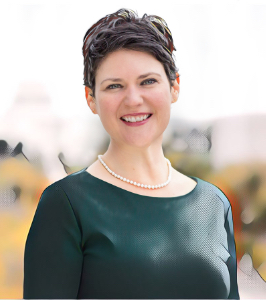What have we learned in 2020?

We’re finalizing this issue of Report from the Capital just days after the conclusion of our long presidential election season. It was an extraordinary election in a previously unthinkable year. As record numbers of Americans cast ballots, the country hit all-time highs in daily new cases of COVID-19 and unrest continued in cities across the country, including in Philadelphia, where people protested the killing of Walter Wallace Jr. by police.
What have we learned about our country, our religious communities and ourselves over the course of this tumultuous — and often heartbreaking — year?
Bridging our country’s deep divisions will take time and personal commitment to healing our broken relationships. As millions celebrated President-elect Joe Biden’s victory, millions mourned President Donald Trump’s loss. God is with both the rejoicing and the disappointed. Jesus called us to love our neighbors as ourselves, even those — I would argue especially those — who vote differently than we do. We too often treat our brothers and sisters as our political enemies. No wonder it is difficult for us to listen and understand.
Examining Christian nationalism can help us understand our political differences. President Trump stoked the flames over the past four years, but this election has exposed what a powerful ideology it is and will remain. How much a person embraces Christian nationalism is a powerful indicator of how that individual views a number of important policy issues, as outlined by sociologists of religion Andrew Whitehead and Samuel Perry in their research. Because Christian nationalism and white supremacy are so deeply entrenched in every segment of our society, it makes it all the more important that we can have constructive conversations about them and how they polarize us. I think this is particularly true when it comes to finding common ground and understanding on religious freedom.
Freedom and human flourishing depend on our support for each other. This year revealed just how interconnected and interdependent we are. Safeguarding our health requires commitment to protecting our neighbor’s health as our own. Communities have pulled together to support struggling individuals, families and small businesses. Faith communities have shown resilience and creativity in adapting their ministries to serve the people around them. American individualism as an ideology won’t meet this moment. In the same way, our freedom — specifically, our religious freedom — is best protected when we think less in terms of one person’s absolute rights in a vacuum and more in terms of protecting everyone’s freedom through respect and compromise in authentic relationships.
Change takes long-term investment in persistent, principled and brave advocacy. We are not the first generation to witness this truth, but it is at odds with the instant gratification that is valued by our culture. Over the past several months, the chant “no justice, no peace” has been repeated at protests for racial justice across the country. I stand in solidarity with the activists and their resolve to take to the streets to fight for reform of the broken system. When it comes to bridging the divides in our society, I think we should adopt a modified version of that refrain: Seek peace, work together towards justice.
Our BJC community models this inclusive approach to change. Rooted in our Baptist perspective, we bring together a diverse community of advocates committed to religious liberty for all. We are investing in our “future faithful”— the next generation of religious liberty freedom fighters. They are passionate people who will stand side by side with you and help defend our shared values.
I invite you to join our cause. Your donation is a powerful statement of your belief in our mission to defend faith freedom for all. Your financial support provides the necessary resources for BJC staff members to train the next generation of religious liberty advocates online and, when it is safe again to gather, in person.
As we close this challenging year, I approach 2021 with hope and anticipation. With your investment in our community, BJC will continue to bring diverse voices together to speak up for everyone’s religious freedom.
Amanda Tyler is executive director of BJC.
This column appeared in the Fall/Winter 2020 edition of Report from the Capital. You can read the entire magazine as a PDF or as a digital flip-through edition.




